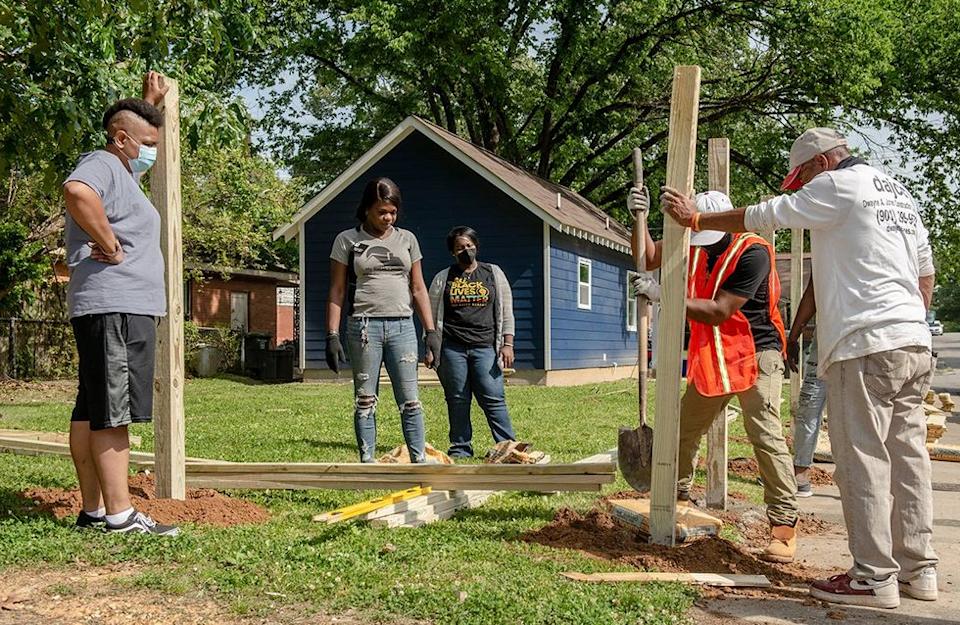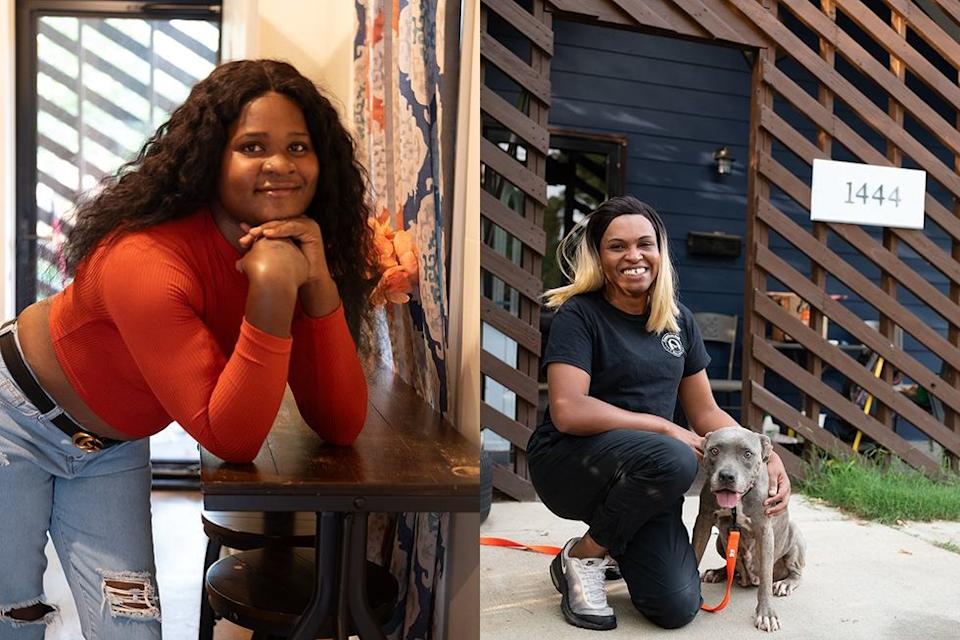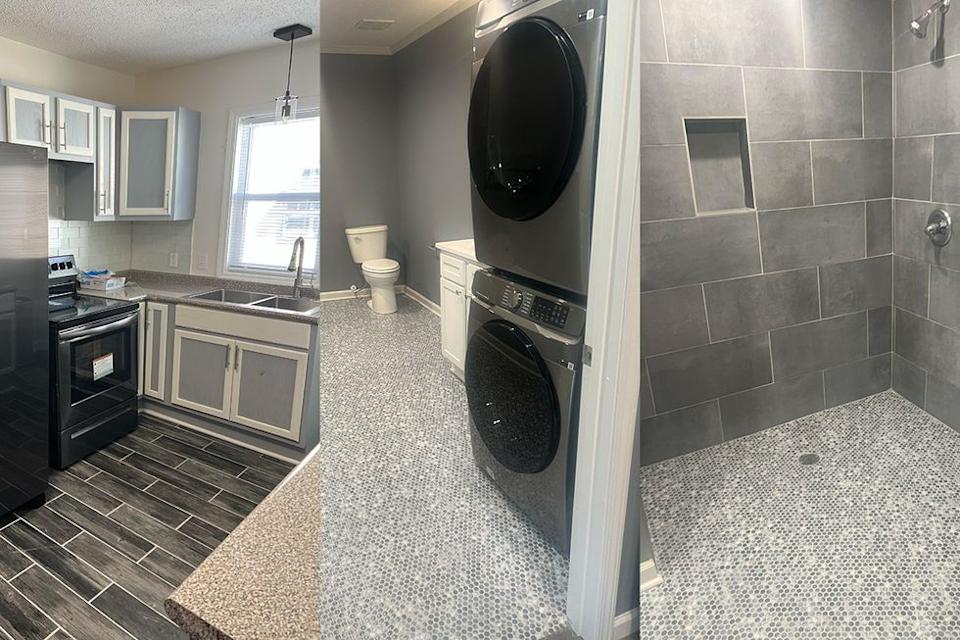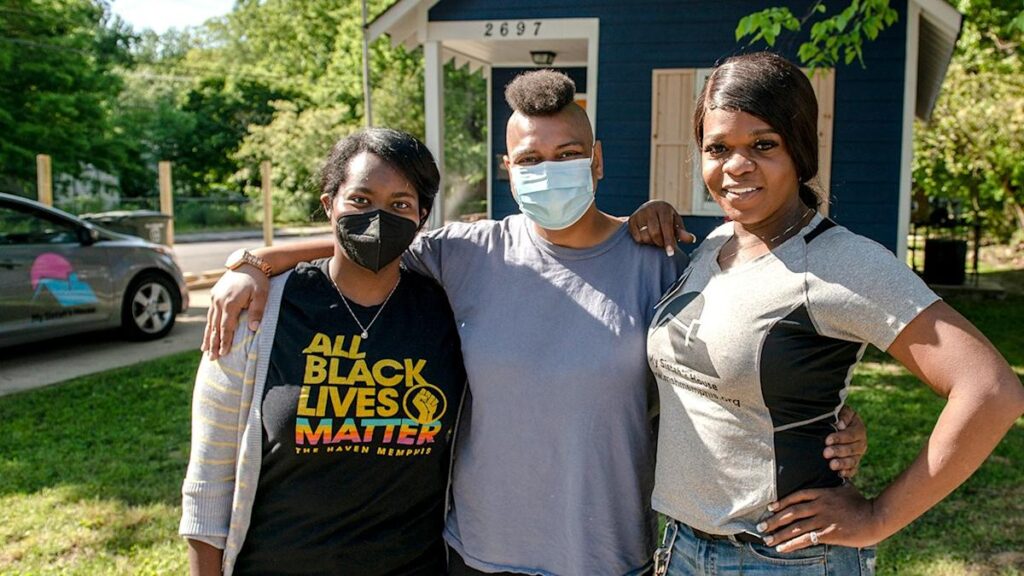While lawmakers across the country push a record number of anti-LGBTQ+ bills, in Tennessee, Kayla Gore is pushing back — not just through protest but with power tools, persistence, and vision.
In a quiet stretch of Memphis, she’s creating something remarkable: a neighborhood of tiny homes designed to house Black transgender people and nonbinary individuals impacted by housing insecurity. Her nonprofit, My Sistah’s House, founded in 2016, is reimagining what safety and autonomy can look like in the South.
Gore and her work are featured in the GLAAD Media Award-nominated documentary American Problems, Trans Solutions, hosted and produced by Emmy and Peabody-winning trans journalist Imara Jones, the founder of TransLash Media. The film follows Gore alongside Breonna McCree and Oluchi Omeoga, each a leading visionary, community-rooted response to systemic failures — from housing inequality to immigrant justice. Gore appears in the film walking through the lots she and her team have developed for trans and nonbinary people in need, describing the homes with pride. “It really helps people who would never, ever in their wildest dreams think they could own a home,” she says in the documentary.
The Advocate recently spoke to Gore about her work and the documentary.
“We wanted to build sheds,” Gore said, remembering how the project took root during the pandemic and Black Lives Matter uprisings. “That was the original goal. But the support came in so strong, we started buying land. An architect reached out. We realized — we could actually build homes.”
Today, My Sistah’s House has completed 11 homes, each one filled. “The 11th house will be occupied on the first [of April],” Gore told The Advocate. “Somebody’s moving in.” More are on the way. But Gore is clear: This work is not aspirational — it’s urgent.
My Sistahs House Memphis Tennessee Kayla Gore completed tiny houses
My Sistahs House Memphis Tennessee Kayla Gore completed tiny houses.Sean Black for My Sistah’s House
According to the American Civil Liberties Union, 527 anti-LGBTQ+ bills are advancing in state legislatures across the country. Tennessee, where Gore’s work is based, is among the worst. In 2025 alone, the ACLU is tracking more than a dozen bills in the state targeting health care, education, and legal recognition for LGBTQ+ people — especially transgender Tennesseans.
“These policies don’t just create stigma — they cause homelessness,” Gore told The Advocate. “We’re already blocked out of economics. Then you repeal HUD’s Equal Access Rule, and trans people lose even the minimal protections we had in shelters.”
Transgender people — particularly Black and Brown trans individuals — face alarming rates of housing instability. According to the 2022 U.S. Transgender Survey conducted by the National Center for Transgender Equality, nearly 30 percent of transgender people have experienced homelessness at some point in their lives due to their gender identity. For transgender people of color, the rates are even higher. According to a 2022 Harvard Civil Rights – Civil Liberties Law Review report, 41 percent of Black trans people have experienced homelessness.
The Equal Access Rule, first established by the U.S. Department of Housing and Urban Development under President Barack Obama in 2012 and expanded in 2016, required that people seeking shelter be housed in accordance with their gender identity rather than their sex assigned at birth. It barred shelter providers from intrusive questioning or requiring anatomical or medical documentation. The rule was designed to ensure that transgender people could access HUD-funded shelters safely and without discrimination — including emergency shelters with shared sleeping or bathing facilities.
However, on February 7, HUD Secretary Scott Turner announced the agency would halt enforcement of the rule, declaring that HUD programs would now be guided by “biological truth” and provide services “based on sex at birth.” Housing advocates, including the National Low Income Housing Coalition, condemned the rollback, emphasizing its harmful impact on already vulnerable transgender people and pledging to continue fighting for equal access.
Gore says the rollback of Equal Access has real consequences: “Trans people are being turned away. We hear it directly from people applying for shelter.”

My Sistahs House Memphis Tennessee Kayla Gore construction team
Gore and her team working on a new building.Sean Black for My Sistah’s House
“Well, it’s not affecting us in a way of funding because we don’t get federal funding,” she said. “But without the strong enforcement of the equal access rule, like many trans people, specifically here in Memphis, they’re going to be displaced, they’re going to be homeless, and, I mean, that’s just the bottom line about it.”
Gore knows this firsthand. She once experienced homelessness in Arizona after losing her job — and says housing became even harder to access once she began her gender transition.
“I had a roof but no stove, no fridge. I was barely able to close my door,” she recalled. “So when I bought my own home, I thought — we can pay this forward. That’s how My Sistah’s House started.”
The homes are modest, light-filled, and permanent. Built through a mutual aid model, they bypass traditional barriers like credit checks and down payments. Residents now sign rental agreements, but Gore envisions a future where a community land trust enables ownership.
“We’re in the process of forming a community land trust,” she told The Advocate. “Some students at the University of Memphis are promising to work with us online, getting through the legal part of forming an actual community land trust so that it protects everybody involved — the organization, our residents, and the people in the adjacent houses.”
But the path forward isn’t easy. Gore’s success has drawn attention — and rising land prices. Lots that once cost $2,500 now go for $15,000. So, the organization is pivoting. A drop-in center and emergency shelter are in the works to meet growing needs on a plot of land that is zoned accordingly.

My Sistahs House Memphis Tennessee Kayla Gore new residents
My Sistahs House Memphis Tennessee Kayla Gore new residentsSean Black for My Sistah’s House
Since the Trump administration returned to office and began targeting transgender people with executive orders, Gore said demand for services has surged.
“In recent months, we’ve seen more housing requests than the entire previous year,” she said.
Still, there are moments of hope when talking about a family who moved from a shelter into one of the homes, Gore beams.
“That was a full-circle moment,” she said. “And people in the neighborhood want to move in too because they see the beauty of these homes.”

My Sistahs House Memphis Tennessee Kayla Gore interior home features
TK CAPTIONSean Black for My Sistah’s House
Her neighbors in South Memphis and Glenview are curious — and often supportive. Some ask how to rent one. Others admire the design. Gore said their interest signals a shift in how trans-led development is viewed — but she also pointed to persistent barriers.
“If a white gay man is living on the street, property values go up,” she said. “But add Black trans women, and suddenly people think it brings the community down.” Gore emphasized that transgender people still face structural and cultural exclusion, even when their presence improves neighborhoods. “People should be throwing land at us,” she said, “but instead, we have to fight for every lot.”
In American Problems, Trans Solutions, Gore explains the practice of putting signs up at construction sites: a signal of pride and presence. “We don’t put them up at occupied homes — we don’t want to put anyone at risk. But while we’re building, it creates visibility and normality.”
Gore lays out her dream: a world where My Sistah’s House doesn’t have to exist.
She admits she said as much in the documentary, but in light of the new Republican regime and escalating threats to transgender rights, she added, “In this climate, it’s just not foreseeable for us to even think that right now.”
For Transgender Day of Visibility, My Sistah’s House is hosting a citywide rally in Memphis. The bridge will be lit in the trans flag’s colors. The mayor will be there. So will the community.
“People say, ‘Don’t you want to move to a blue state?’” Gore said. “But the work is here. Memphis is a blue city in a red state. Our local government supports us. And our community needs us.”
Watch the documentary American Problems, Trans Solutions below.
– YouTube www.youtube.com
Read the full article here
